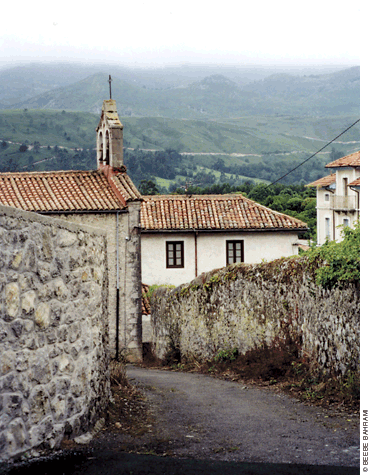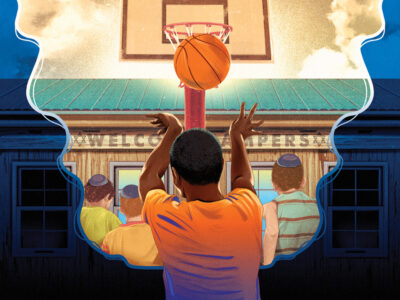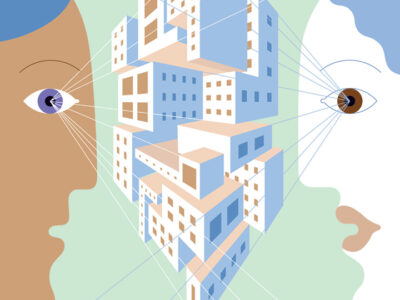
“Eat this,” he insisted. “You’ll be able to have children.”
By Beebe Bahrami | I walked right up to the bar, past five men in the front room who were debating the relative weaknesses and strengths of Seville and Bilbao’s soccer teams, when one suddenly yelled, “Pedro, hey, Pedro, you have a customer!” Pedro came out from the back room. “And what are you if not a customer?” His friend, a white-haired mischief-maker and the oldest man there, laughed. “Don’t worry, don’t worry. I always pay my bill before I leave.” A small man who sat to his left quipped, “That’s the trouble, you never leave!” A burst of laugher erupted.
Pedro turned to me: “How can I help you?”
“I’d love a cold beer and a jamon Serranosandwich.”
“You’ve been walking, haven’t you?”
“Yes, just from over the hill.”
He smiled. “After walking, eating and drinking! It’s a good mix.”
While Pedro made my ham sandwich, I took my beer to an outdoor table to sit and write. When he brought my food a few minutes later, he looked curiously at my red notebook but said nothing.
For years I have been visiting Spain’s northwestern provinces of Galicia and Asturias, which had attracted me ever since I read works by other anthropologists on the vestiges of a matriarchal culture in that part of Spain—a region that remained isolated throughout invasions of Visigoths, Romans, Arabs, and Castilians. Even today, there are still delicious survivals, such as the confidence and personal power of both women and men, the huge number of women-owned and run businesses, a reverence for Mary and her power over water and fishing boats, and a lovely reverence for the natural world.
But I had never been there alone, and I worried that I’d over-romanticized the place. Then, two summers ago, I had a free spot of time to return, but my husband, Miles, could not come with me. “You should go,” he said. “It will be a good chance to test all your impressions of Asturias and if it really is so easy to be a woman there; I’d only get in the way of that.” A day later he handed me a map marked with the surf spots he wanted me to report back on—his final blessing.
I arrived two weeks later in Cue, a traditional fishing and farming village right on the Atlantic, where I would be for a week and a half. One morning after breakfast I struck out on the road to Andrín, a village east of Cue, to pursue my two-pronged mission. Tranquil, web-like footpaths connected the villages and towns along the coast and would take me to the nearby beaches Miles had marked. They would also take me far off the beaten path, into remote areas. Here’s my chance to see how easy it is to be a woman alone around here, I thought.
Ballota beach was the first on his list. Peeling off from the main road, Ballota’s access was a dirt red road that wound like a dark river slowly to the bottom. It was a steep decline lined with oak, elm, pine, and chestnut trees. The groundcover, as in so many forests in Asturias, was a sea of lyrical ferns swaying with the lightest breeze of movement from a nearby bird. Halfway down to the beach I felt the strong presence of nature spirits, beings the folklore of these parts speaks about as being under the sway of independent, feminist, and wild Artemis, known also as Diana, or here as the xana. I was sure I had wandered into a sacred site, a place the ancient Celtic-speaking Astures would recognize as holy.
But the waves were flat. I’d have to make another surf check, on a day when there was more action. For now, the ocean spirits were taking a nice midmorning siesta.
Andrín beach was next. The swell was picking up and there was a bit of wind, just enough to create small, chaotic choppiness in the waves. It had been a few hours since I’d left Cue, and I was hungry and thirsty.
I turned toward the village of Andrín, nestled in the green valley about a half-mile behind its beach. Like any self-respecting Spanish village of 300 people, Andrín had at least four bars and restaurants. Pedro’s was the first one I found.
As I relaxed on the patio, I drank, ate, and wrote in my notebook. From the corner of my eye I saw the elderly man, the mischief-maker, glance through the open door and then speak quietly to his cohorts. His short friend kept pushing at him, as if to say, “Go on now, talk to her.” The other three men waved their hands, less forcefully mimicking his efforts.
Finally, Mr. Mischief came outside. “Listen, it’s driving us crazy, you out here, we in there, wondering who on Earth you are. Please come and join us. It would be a shame for you to sit all alone when all of us charming men are over there.”
From the time I had walked in, I could tell they were harmless. I closed my book, picked up my beer and sandwich, and joined them. The older man and his small friend sat to my left while the three others sat to my right. One was a salt-and-pepper-haired man with wayward teeth; next a large man shaped like an iron kettle, round everywhere—belly, face, cheeks, lips, eyes, and glasses; and finally a young man in his twenties. A few minutes later, we were joined by two more—another youth, shy, with dark-rimmed glasses and black, wildly curly hair, and a man in his forties with the tough, dark, leathery skin and sparkling light-colored eyes of a fisherman.
Mr. Mischief began. “Where are you from?”
“The U.S.A.”
“Are you writing about us in that book?” He pointed at my red notebook.
“I’m writing about all my impressions of being here.”
“Are you a señora or a señorita?”
“A señora.”
“Where is your husband?”
“He couldn’t come just now. Perhaps he’ll visit later.”
“How do you know Spanish?”
“I studied in Seville years ago and fell in love with this country.”
“Then your husband is Spanish!”
“He’s American, but he loves it here too and is learning Spanish.” I decided to throw down the next card in this game of poker. “We want to live here, at least part of the year.”
An extra spark in his eyes, he looked at his companions. “Get rid of your husband, just dump him, and marry one of us!” he said. “That’s the swiftest way to live here and the easiest.”
“But I’m very fond of my husband. I’d be sad to leave him.”
The round one suddenly jumped up and stepped into the circle center. “Marry me”—he did a little jig with his hips—“and I’ll give you a house.” Riotous laughter erupted. The elder then quipped, “Sure that’s fine, but what else can you provide?”
The round man held his arms wide as if he were about to hug a tree. “Look at my form, am I not the fountain of plenty? I can offer not just a house, but a good time. My ample size should hint at other largess …”
Howling is the best way to describe the reaction. The salt-and-pepper-haired man with the funky-toothed grin then said, “Marry me and you will have a house here in the heart of the village and this fine company.” He swept his arm to include all gathered.
The fisherman, with his sparkly eyes and warm easy smile, reiterated how much easier it would be to live in Spain if I became Spanish through marriage. “If you marry me, you will have instant citizenship and an instant house: mine.”
His younger friend, who had been quiet and reticent until now, suddenly added, “And instant children. Just look at him!” More howling and some whooping.
“Ah, you men, you overlook that there really is more than just size,” said the small man, miffed. “There’s style, and technique.” He flourished his hand and bowed as if he were a nobleman in the king’s court. Even louder howling ensued.
The round one, rather deflated by now and still standing in the circle center, shrugged his shoulders. Pointing his hands at his chest, he quietly repeated, “No, really, pick me. I’ll make you happy.” He then sat down.
All eight of them, including Pedro from behind his bar where up until now he had tried to ignore the flamboyant display, looked at me expectantly, awaiting a verdict after such roostering about.
“Dios mio,” I began cautiously, “such offers, how could a woman refuse? But, no, no. I think I better keep my husband. Consider this. He’ll want to come here and challenge you. But if you drop this now, when he does visit, he’ll like you so much he’ll want to be your friend.”
They all laughed. The elder said, “Yes, true, a man needs friends as much as he needs a woman. So, for now, you’re here alone. Well, joking aside, you should feel comfortable here traveling sola. It’s a safe place to be.”
So, that took care of one of my two questions—and the fact that I’d never had to pose it made the answer all the more potent.
Then he asked, “Do you have children?”
“No.”
“No?”
“No, that’s the way it is.”
“We’re sorry to hear that.”
I didn’t dream of telling them I had no children by choice. The Spanish treat children as a joy in life that no one should pass up. Though Spain now has one of the lowest birthrates in the world, the change has been sudden and dramatic, dropping by 50 percent in 28 years. I wasn’t sure what these fellows knew or thought about this statistic, or if they would understand that a person could love children even if they chose not to have them.
“Wait,” said the elder suddenly. He went into the kitchen, where Pedro and a young man were preparing lunch. We heard the clank and swish of a heavy skillet hitting the fire. Leaning to my right, I could just see that Mr. Mischief was back there grilling something. When they were done, Mr. Mischief came back into the bar, trailed by the young cook bearing a plate of just-off-the-grill pinchos de moruno, marinated and grilled paprika-infused pork kabobs.
“Eat this,” he insisted. “The meat is good for you. You’ll be able to have children.”
I politely smiled at him, hiding how stunned I felt. This was getting weird in a sort of bizarre, beautiful way. Was this also matriarchy?
Like mother hens, all the men piped up. “Yes, eat, eat. The more meat, the better the odds.” I insisted I not eat alone—how weird is that?—and after a few minutes all of us were eating the delicious kabobs, with me both enjoying the flavor and feeling utterly odd about being the center of a fertility rite.
Next, they wanted to buy me another beer, or wine, which was better. “Wine opens the heart,” the elder commented. I wondered if this was another fertility notion: an open heart opens the womb? Lord knows. I felt excessively like a biology exhibit. I also felt a bit deceptive: Fertility was not something I needed to have or worry about.
I let them know I had had just the right amount to drink and would be on my way soon. “Oh, please, you can’t leave until you pick one of us! Come back tomorrow and we’ll make all the arrangements.”
“I’ll return with my husband next time,” I said. “He’s a wonderful man and you’ll be so happy to have a new friend in him that you’ll forget all about this.”
I went up to Pedro at the bar counter to settle our account and to buy a bottle of water for a return trek to Andrín’s beach. All the men wished me good travels and bid me to return the next day. I thanked them for their interesting company, food, and drink. As I walked to Andrín’s beach, I felt warmed inside, knowing that I’d just enjoyed a drink with good-hearted, gender-comfortable people.
Andrín beach’s swell conditions sealed the deal: this was a place to really consider living. The initially choppy chaotic conditions had turned within a short time into clean, long, even-peeling, left-breaking tubes that were about two feet high. One endless, perfect wave after another unfolded. It was so perfect it was dreamy. And not a soul was in the water. It took an hour to peel me away from the waves and return to Cue.
After a few more days, I said goodbye to my new friends, and to the resident xana, to the little sparrow with red shoulders who talked to me on my treks into the woods, to the black and white cows whose milk made superb cheesecake, to the brown bull who kept them in line (the only form of blatant patriarchy I’ve witnessed in Asturias), and walked down the forest path that took me into the nearby town and the bus station.
It began to schfitze misty rain and the outside world felt like my inside world. It was hard to leave. But I’d be back, with Miles next time, so that we could get into the water and ride some waves. I also wanted him to walk with me to Pedro’s bar-tienda so that he could meet his new male friends, the eight mother hens of Andrín. Let them feed him roasted pork and wine. That would be worth watching.
Beebe Bahrami Gr’95 is an anthropologist and writer who contributes frequently to the Gazette.




